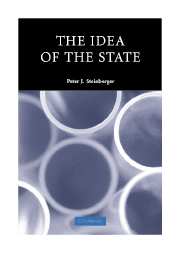4 - The Omnicompetent State: Toleration and Limited Government
Published online by Cambridge University Press: 22 September 2009
Summary
Contemporary political discourse is deeply invested in what one writer calls the “art of separation” – the activity of designing, in thought or in practice, walls that figuratively or even literally separate the political sphere from other spheres of human endeavor. Some such notion represents what may be thought of, without too much exaggeration, as a kind of orthodoxy. Political theory today is concerned hardly at all with the question of whether or not to construct and maintain walls of separation. It focuses, rather, on the problem of exactly what should be kept apart from what. Is it, for example, the individual person, understood as a bearer of natural rights and an embodiment of moral personality, who should be protected from the intrusions of the political state; or should we rather afford such protection to communities of persons, each community understood as reflecting a particular structure of values or way of life? Where, moreover, should we draw the line? What kinds of activities should and should not be subject to the exercise of public authority? On what grounds might we make such distinctions, and why should certain spheres of endeavor enjoy privileges that others are denied? How, finally, should we construct our partitions? Which mechanisms can most effectively and expeditiously achieve the desired separations? Liberals and communitarians, individualists and holists, elitists and democrats – all seek in different ways to build walls aimed at limiting or confining the activity of the state.
- Type
- Chapter
- Information
- The Idea of the State , pp. 149 - 193Publisher: Cambridge University PressPrint publication year: 2005

